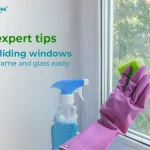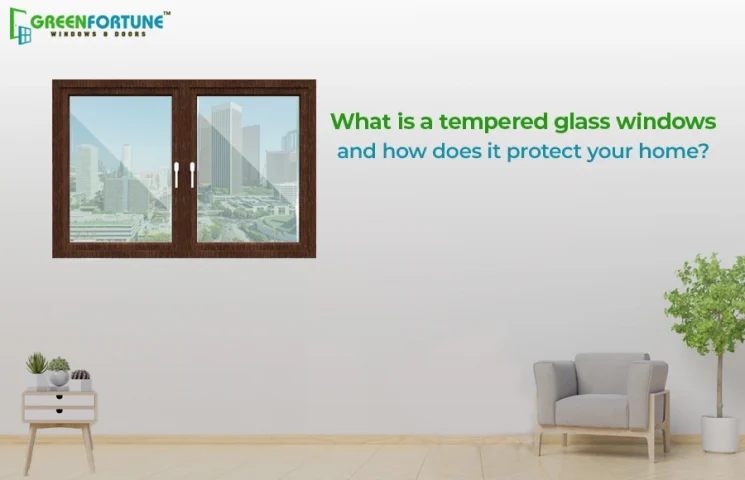
How to Clean sliding window tracks? These 7 expert tips will help you maintain spotless windows
November 11, 2024
Maximizing Fresh Air and Natural Light: Best Balcony Door Designs in 2025
November 12, 2024Introduction
Tempered glass, often heard of in the context of mobile screen protectors, is used widely in our daily lives for its strength and safety features. This glass undergoes a heat treatment process that makes it approximately four times stronger than standard annealed glass.
By design, when broken, tempered glass shatters into small, blunt pieces, significantly reducing the risk of injury. In the event of shattering, tempered glass windows can help protect a building’s occupants and equipment from the hazards of large shards of fragmented glass debris.
In this blog, let’s understand what is tempered glass and if it is a good choice for windows at your home.
What is Tempered Glass?
Tempered glass is produced through a process of extreme heating and rapid cooling, tempered glass is much harder than standard glass. In contrast, regular annealed glass undergoes a thermal tempering process that increases its strength and changes its composition to shatter differently.
The glass is heated in a furnace to temperatures exceeding 1,000 degrees Fahrenheit and then quickly cooled using high-pressure air blasts. This cools the outer layers of the glass much faster than the inner layers, causing the interior to contract as it cools and pulls away from the outer layers.
As a result, the inside remains in a state of tension, while the outside goes into a state of compression. These opposing forces are what give tempered glass its superior strength compared to annealed glass. Due to the tempering process, when this type of glass is broken, it shatters into small, rounded pieces rather than sharp, jagged shards.
Regular, untreated glass is known to shatter into sharp fragments known as spalls, which can pose a serious injury risk during extreme weather events or attacks, such as bomb blasts. Tempered glass is often referred to as “safety glass” for its ability to prevent spall and the safety of building occupants.
What is Tempered Glass used for?
Often referred to as “safety glass,” tempered glass is often used in car windows, shower doors, glass tables, and other installations where increased safety standards are necessary. Although the manufacturing process enhances its resistance to impact, the tempered glass window is not shatterproof or unbreakable. Therefore, it shouldn’t be used to prevent intruders, but it will stand up to more force than regular glass.
The tempering process also increases the resistance of tempered glass windows to damage from elevated temperatures. That’s why you may see tempered glass used in situations where high temperatures are likely to cause the glass to break like in fireplace doors or kitchen appliances.
Disadvantages of Tempered Glass
One of the primary advantages of tempered glass, its ability to shatter into tiny pebbles, can also be seen as a disadvantage. Because the glass is engineered to break completely upon impact, it may present a security risk. Motivated intruders may find it easier to gain access, as a single force can cause the entire window to disintegrate.
Moreover, once glass has undergone the tempering process, it cannot be resized, recut, or reshaped. All sizing must occur before the annealed glass is treated because once it is tempered, it is too susceptible to breakage to be cut or adjusted. Any damage to even a small section can lead to the entire glass sheet shattering, making precision and careful planning essential when working with tempered glass windows.
Tempered Glass vs Laminated Glass
Laminated glass is made by layering two sheets of tempered or standard glass around a clear plastic film. The glass is first treated to eliminate the existence of any air bubbles/pockets and is then heated for the first round of melting.
PVB acts as an interlayer that keeps the glass layers together, even when the glass breaks or is impacted with great force. Laminated glass is produced by bonding the glass layers and interlayer with heat and pressure, resulting in a compact structure that stays intact rather than shattering when struck by intruders or burglars.
On the other hand, tempered glass is produced in the process of toughening standard glass to give stronger glass. This toughening process makes tempered glass several times stronger than standard glass, though it is not as impact-resistant as laminated glass. These treatments give the glass a better balance of internal stress, which makes it better at resisting force up to certain levels.
When building owners are choosing the best glass for their windows and doors, comparing laminated and tempered glass is common. Some of the main features to look at to differentiate the two include the make-up, strength, cost, and the intended purpose for the glass installation.
Conclusion
Tempered glass offers enhanced safety and strength, making it an excellent choice for windows in homes where impact resistance and reduced injury risk are priorities. While it has advantages over standard glass, such as shattering into blunt pieces, it’s essential to consider its limitations, particularly regarding security and customization. Ultimately, understanding the unique properties of tempered glass can help homeowners make informed decisions about their window options.
Discover GreenFortune, Your Partner in Quality uPVC Windows and Doors
At GreenFortune, we are proud to offer high-quality uPVC windows and doors at affordable prices. We offer and install a variety of window types for all homes with both durability and aesthetics in mind.
Contact us to find out more about the uPVC window design that we offer. Whether you are renovating your existing home or building a new one, partner with us to elevate the comfort levels and energy efficiency in addition to the style quotient of your space provided by our superior-quality uPVC windows.
FAQ’s
Is tempered glass good for windows?
Yes, tempered glass is good for windows as it is strong, safer upon breakage, and more resistant to temperature changes than standard glass.
What is the lifespan of tempered glass?
The lifespan of tempered glass can vary, but it typically lasts 20 years or more when properly maintained.
Which is better glass or tempered glass?
Tempered glass is generally better than standard glass because it is stronger, safer upon breakage, and more resistant to thermal stress, making it ideal for applications requiring enhanced safety and durability.







